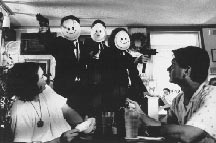
A Review: Starving Artists
Written by Julie Wolf | Posted by: Anonymous
Starving Artists has something for everyone. Puns, anyone? Don’t like puns? Don’t worry; there’s slapstick. Slapstick’s not your bag? How about satire? Satire not satisfying? Try romance. And did I forget to mention the barrel of monkeys?
It’s hard to imagine not being satisfied by Allan Piper’s Starving Artists, the closing-night feature of the Woods Hole Film Festival on August 8. Amusing and entertaining, the film is refreshing, too. Despite screwball contrivances and somewhat undisciplined humor, it portrays artists honestly: as people devoted to their craft, yes but what they really want is to make a buck.
Speaking of, much has been made of the filmmakers’ innovative fund-raising strategy: donate money, even a dollar, and your name will appear somewhere in the film: in headlines, graffiti, on handwritten signs taped to the walls of the main character’s apartment. (Printing costs and calligraphers were obviously not figured into the budget.) Piper and his crew, however, earned the recognition they received by making a funny movie, recipient of Film Fest New Haven’s Audience Award for Comedy Feature and also Rest Original Screenplay and Best Production Design in a Comedy at the New York International Independent Film & Video Festival.
The plot follows three artists-playwright Zach (Piper himself), graphic artist Joy, and director Jay as they follow their muses, surrounded on every side by wackiness. A lot of wackiness ensues in this movie, sometimes too much. After all, straight lines are as crucial to humor as punch lines. Be that as it may, Zach, Joy, and Jay are the straight men (or women.) tried by, and ultimately triumphant over, the nuttiness around them: there’s the actor who refuses to walk on stage without a glass of milk; the copy shop employee who refuses to copy "copywritten" materials even for the author; and so on. Through it all, the characters stay focused on their goal – success through art – and even find time to enjoy predictable romances. (That’s not to say the romances are entirely without charm – excellent use is made of the proposal scene from Henry V-but they could have been drawn with more depth and intrigue).
Filmed on location. in and around Cambridge, the latter-day screwball comedy – Allan Piper (Zach) and Bess WohI (Joy) aren’t quite Cary Grant and Katharine Hepburn, but Piper collides nicely with lampposts, and WohI endures physical mishaps attractively – also provides a fleeting look at trendiness and hype in filmmaking through Jay ‘s "upside-down movie." A malfunctioning projector shows the film until then just another under-funded Tarantinoesque shoot-’em-up,upside down to prospective investors, and sparks a very 90’s-type media craze.
A montage sequence illustrates Jay’s arrival as an important Filmmaker, but ultimately it raises more questions than it answers. There are too many other things happening in the film (for much time to be spent on thoughtful contemplation of fame and filmmaking, but is Piper actually asking the viewer to take something seriously? If he is, it’s a rather abrupt change of tone for a movie that until now has taken nothing seriously, or if not seriously, then beyond face value. Is Piper saying hype is everything, and content, or at least intent, nothing? An interesting point, but it’s impossible to get a handle on Piper’s motives in bringing it up.
Similarly, Piper later seems to urge the viewer to contemplate art’s responsibility – enlightenment or entertainment – but he doesn’t effectively switch gears in a movie which regularly throws out puns like "frozen yoga." My point is not to belittle puns, but to question Piper’s aim. Defending her unfavorable review of Zach’s play Last Days, a musical comedy about the end of the world, Joy says, "I really enjoyed the show. It’s funny, but it doesn’t go beyond that." Zach counters her argument – I’ll assume it’s Piper countering, too – "You loved it. It made you laugh. It made you look at everyday things in a new and funny way." This, he says is art. Pretty heady stuff, but skated over in the same way that Joy accuses Zach of skating over "deep themes" in his play. For the record, I thought Starving Artists was light, but that didn’t bother me, what did was this foray into discussions on the nature of art. They were merely plot devices, yet another point of cute disagreement for Zach and Joy, and therefore incongruous and unnecessary.
The film’s periodic lack of focus gives Starving Artists its underdog feel, and you can’t help but root for an underdog. There’s a certain exuberance/desperation to the film that’s appealing. Every line is jam-packed with humor, as if Piper were afraid he might never get funding for another movie and would therefore cram all his darlings into this one. Fortunately, Piper has a relatively good sense of humor and timing, but he might have done well to heed Faulkner’s advice: "Kill your darlings." Many places were ripe for scaling back: Zach’s struggle to curb his cursing fell flat, and most of the lines delivered by hit man Bert were simply unfunny. Starving Artists could have benefited from a more discerning red pen, because a little zaniness goes a long way. But as Cabaret Voltaire sang in the 80’s, "This is entertainment, this is fun," and Starving Artists is both.










